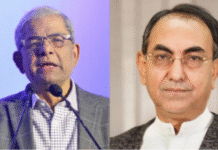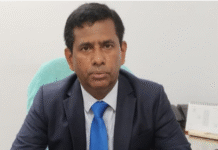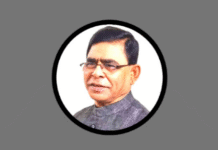Representatives of the Adivasi communities in Khagrachhari have claimed that the spate of communal attacks by ‘Bangalee settlers’ on four Adivasi villages at Taindong union in Matiranga upazila from July 29 to August 3 was influenced by the culture of impunity shown to similar attacks in the past.
The attacks on the one hand was driven by the settlers’ greed for grabbing lands in the hills owned by the Adivasi communities and part of the decades-long grand plot of ethnic cleansing by the state in the Chittagong Hill Tracts (CHT) on the other, they observed.
They also expressed their dissatisfaction over the inadequate government-relief to the affected families, noting that some 1,000 Adivasi families in Taindon are living in a desolate condition as most of their valuables and belongings were looted during the attacks.
The observations were made by the leaders of a citizens platform, ‘Relief Collection and Distribution Committee for the Affected in Taindong-Tabalchari Area’, at a discussion with a team of Dhaka-based lawyers, political, human rights activists and reporters at a boarding in Khagrachhari district town on Friday.
Relief Committee convener Kiron Marma said the impunity from previous communal attacks by the settlers on the Adivasi people has been acting as a major impetus for the increase of such attacks in recent times.
“In most of the cases, complaints against the settlers are not listened to by the law enforcement agencies. They only take complaints when the incidents are severe and could not be hid. And there’s no single example over the decades that the persons involved in the communal attacks got the punishment for the crime,” he said.
“I must note that the arson attacks and vandalism of assets by the settlers at Taindong happened in presence of BGB (Border Guards Bangladesh) officials. The officials have also admitted the fact,” he said.
He also noted that every time the settlers attack the Adivasi villages, it happens near BGB camps.
Meanwhile, a BGB officer in Tainding, preferring anonymity, defended their reported supportive role in the attacks by saying, “If the BGB personnel were not there, 300 houses could have burned down in the adivasi villages instead of 30 houses.”
Relief Committee member Dhiman Khisha said the attacks on Taindong villages, like all other previous attacks by settlers on the ethnic minorities, are mainly driven by the lust for grabbing more Adivasi lands by means of fear.
“Most of the settlers enter and expand their territories in the CHT in this method, taking advantage of the traditional community-based land owning system of the Adivasi communities that is protected by laws, but being violated by the administration since long,” he said.
“A piece of land designated to a member of the Adivasi community can’t be exchanged for anything without the permission of the headman of the community. But the settlers are managing to get the ownership declaration and false land deeds from the administration,” he said.
Dhiman said, “It’s totally illegal to claim a piece of land in the CHT without the document of permission from the Headmen, but the Bangalee communities from other districts in the country are being settled without the knowledge of the headmen.”
The process is gong on for decades and pushed the Adivasi communities in the CHT, particularly in Khagrachhari, on the back foot.
“It has already changed the demography of the district (Khagrachhari) violently. In 1947, the Bangalee population in the district was only 1.97 percent. In 1971, only 12 Bangalee families used to live in Taingong, but at present the population accounts for the majority in the upazila – about 80 percent,” he noted.
“Illegal land grabbing, impunity from communal crimes are all linked in the same thread – a process of ethnic cleansing by the majority of the state,” he said.
On the aftermath of the Taindong attack, the Relief Committee visited the affected villages and prepared a report on the losses of the Adivasi people therein. The report said losses due to the arson attacks and vandalism was worth Tk 1,72,03,610.
The relief so far distributed to the affected is comparable to a drop of water in the sea, the report observed.
In the report, the Relief Committee demanded that a compensation of 6 lakh and a five-yea ration be distributed to the families whose houses were burned down and valuable looted during the attacks.
The nine-point demand also include government steps against the BGB officials present during the attacks, forming a judicial probe body to ensure punishment to all involved in the attacks, and transferring the case filed in this regard to by Anil Baran Chakma to the speedy trial tribunal in Chittagong.
Source: UNBConnect










